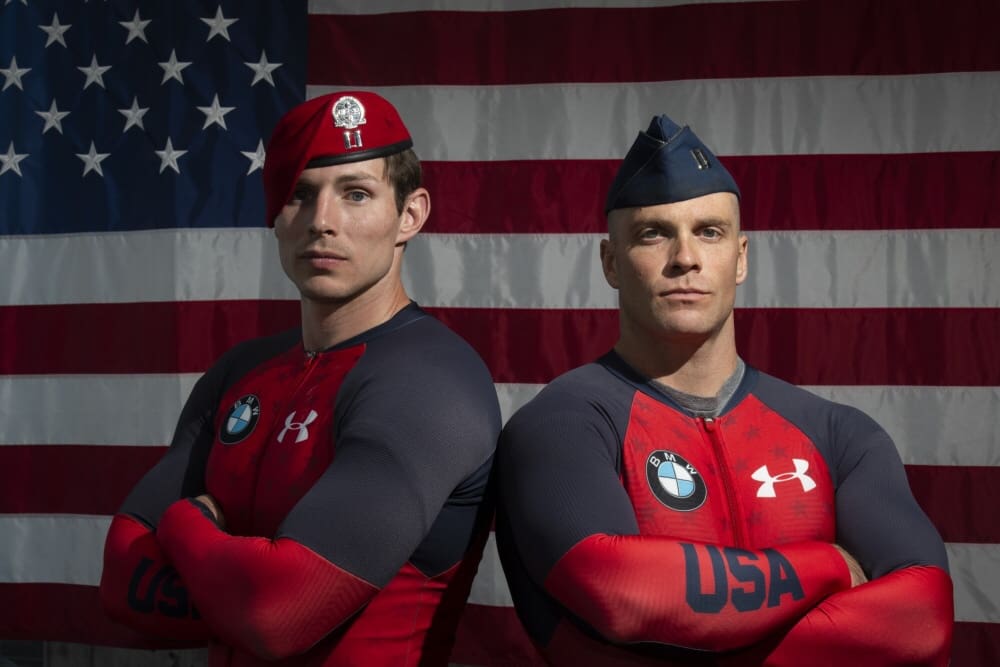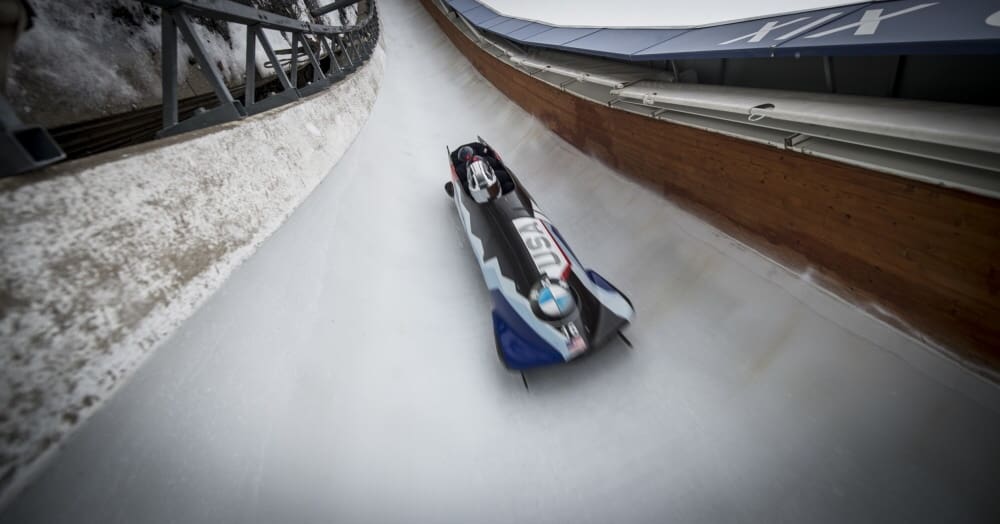Hours, days, weeks, months and even years of training have prepared two Airmen for one moment – four explosive seconds at the top of a winding icy track in a city that once hosted the 2002 Winter Olympics.

(From left) Capt. Chris Walsh, a Special Tactics officer with the 24th Special Operations Wing, and Capt. Dakota Lynch, a U-28A pilot with the 34th Special Operations Squadron, are push athletes who are competing for a spot on the U.S. Olympic bobsled team in 2022. As push athletes, both Airmen train vigorously on sprinting and strength to accelerate a bobsled up to 24 miles per hour in close to four seconds while the pilot focuses on navigating hairpin turns in a choreographed chaos down the ice. (U.S. Air Force photo by Staff Sgt. Ryan Conroy)
Early days of sprinting, heavy lifting, box jumps and squats have faded into late nights of sanding runners, making countless adjustments and pushing through frustrations to shave off hundredths of a second pushing a 500-pound sled 60 meters.
The goal? A chance to make a team in four years. A chance for a medal. A chance to represent their nation and the Air Force. A chance.
Two Airmen within Air Force Special Operations Command were selected to compete with the USA Bobsled team this year. Capt. Dakota Lynch, a U-28A pilot with the 34th Special Operations Squadron, and Capt. Chris Walsh, a Special Tactics officer with the 24th Special Operations Wing, are push athletes who are ultimately competing for a spot on the U.S. Olympic team in 2022.
“If you want it bad enough, you’re going to do whatever it takes to be successful … that’s the grit of this sport,” said Walsh. “It takes four years of commitment to make yourself better with every opportunity and even then you’re never really quite there … you have to keep grinding.”

As push athletes, both Airmen train vigorously on sprinting and strength to accelerate a bobsled up to 24 miles per hour in close to four seconds while the pilot focuses on navigating hairpin turns in a choreographed chaos down the ice.
“It’s a metal and carbon fiber bullet rifling down an ice track at speeds of 85-95 miles per hour,” said Lynch on the experience. “It’s like a fast-moving jet with a monkey at the controls while getting in a fight with Mike Tyson … it can be incredibly violent.”
Preceding the countless hours in the gym and on the track, the ride begins with a dream to succeed at the highest athletic level. For Walsh, it was an article in a magazine and for Lynch, it was a challenge from friends while deployed to Africa. For both, it would begin a journey of bruises, scrapes and exasperation that would lead them to Park City, Utah, for the International Bobsled and Skeleton Federation North American Cup.
The first steps of their journey was a gauntlet of tryouts and selection beginning with an open combine. From there, standout athletes were invited to rookie camp and then push championships in Lake Placid, New York. Both Lynch and Walsh excelled once again and were invited to national team trials to continue to the next phase — competition.
“It relates pretty closely to the job because there’s days where you know it’s going to be tough,” said Walsh. “Every workout, every time I’m in the garage with the team, every step I take is either taking me closer or further away from my goal. If I’m lazy and I decide to slack one day … that workout may mean the difference between me making the Olympic team or not.”
Both Airmen attribute their time in AFSOC to their success on their bobsled journey. Walsh is a member of Air Force Special Tactics, which is a special operations ground force comprised of highly trained Airmen who solve air to ground problems across the spectrum of conflict and crisis.
“The qualities that Special Tactics fosters in individuals translates very well to bobsledding,” said Walsh. “ST operators are mature, responsible and disciplined and need to be squared away as an individual. If they’re not, the team as a whole is weak … so having that grit and determination to see the mission through is a big piece of what makes me successful here.”
For Lynch, the team mentality of a four-man bobsled loosely correlates to responsibilities of piloting an aircraft. The U-28A aircraft Lynch flies provides an on-call capability for improved tactical airborne intelligence, surveillance and reconnaissance in support of special operations forces.
“In AFSOC I am responsible for the aircraft, the men and the women on that aircraft and ensuring the mission is executed properly, safely and precisely,” said Lynch. “Things aren’t going to get handed to you – conditions are going to suck, you’re going to get your crap punched in, but you’re going to have to have the strength and resiliency to drive through it and press forward.”
As active-duty Airmen, both Lynch and Walsh have had to negotiate service commitments with leadership support. Both have been granted permissive temporary duty by their respective commanders to vie for a chance at being accepted into the Air Force World Class Athlete Program.
WCAP provides active duty, National Guard and reserve service members the opportunity to train and compete at national and international sports competitions with the ultimate goal of selection to the U.S. Olympic team while maintaining a professional military career.
“I wouldn’t be here without my squadron and group commanders taking a chance on me and giving me a shot,” said Walsh. “It makes me want to do really well to represent my country, the Air Force and AFSOC in a good light.”
Story by SSgt Ryan Conroy, 1st Special Operations Wing Public Affairs


And who in their units fill in for these guys when they are gone playing winter games?
Hubb,
Folks go off to mandatory or advanced schooling and other Temporary Duty (TDY) assignments all the time. Being detailed to work in embassies around the world or with inter-agency partners for example is especially common in SOF units. Often for extended periods. This is no different. In publicized cases like this, the Services – including USSOCOM – benefit immensely from the positive exposure to the public. In turn, that supports both recruiting and funding / budgeting initiatives – and that is a good thing.
TLB
Mr. Baldwin,
Thanks for the thoughtful reply. I enjoy your articles here on SSD and know that you have extensive military experience. I agree that schools and TDY’s can take people away from their normal duties and this is a legitimate part of military service.
However, bobsledding is a waste of time. Possibly, the more irrelevant winter sports, other than bobsledding, would be figure skating or curling. These two officers are in “low density, high demand” career fields that have chronic shortages of personnel to accomplish an unending set of missions around the world. I do not agree that this is a good recruitment activity because I doubt that there are masses of military age males and females that watch this sport and then would be inspired to join the military. The needs of the Air Force should come first and I do not see bobsledding as a critical need. Thank you.
I had a an LT that worked for me at the 21st STS who would go play for the USAF female interservice soccer team several times a year. We got by fine when she was doing things which made her a better person. Those experiences applied to her service as well.
These young men will not only personally benefit from this experience but so will the service.
Hubb,
I second what SSD says above. I also agree that you make a fair point about the needs of the Air Force coming first. Granted, day to day activities of a specific unit may be impacted by the temporary loss of a person or two. However, I would be willing to argue that the greater needs of the Service are being met by these types of special duty.
I have no personal insight into how many people watch bobsledding at the master (Olympic) skill level. I admit it is not a sport I watch. I do know that Olympic athletes in general get a lot more exposure to the public than an Airman – no matter how talented or dedicated – likely ever will. In terms of successfully competing for talent, the Services have to have as much positive exposure as they can get.
Moreover, and to piggyback off of what SSD said, this particular case illustrates the kind of individual opportunities that the Services have to invest in to cultivate and retain that kind of high-end talent. Otherwise, we are likely to lose them as soon as their service obligations are completed anyway.
Not a smart way of doing personnel management business in this day and age. Although it is still more talk than action right now, I expect flexible “talent management” like this is going to become the norm rather than an exception in all of the Services for the future.
TLB
Hubb, dang, I’m not gonna weigh in the cost/benefit to the Air Force ( I think SSD and Terry Baldwin covered my opinion pretty well), but I feel motivated to defend figure skating. I’m not a skater, nor a serious fan, but…I’ve got to say, that every 4 years, the Olympic figure skating is simply one of the most inspiring and beautiful displays of human artistry and achievement that there is to see. Strength and commitment combined into an idealization of life’s possibilities, something that makes the world so might brighter and better…but, YMMV. 🙂
AbnMedOps,
If we are talking Will Ferrel “Blades of Glory” type of skating then maybe. If we are talking Johnny Weir type of skating then you are on your own.
Well, Johnny Weir is pretty good at what he does, but I’m personally more in awe of the chicks! 🙂
Sure, but they don’t even do the figure skating part anymore. It’s all the fancy routines now days.
The only thing that bothers me about this is wearing military headgear with the Olympic uniform. It looks like they are extras in some b grade superhero movie.
Sad that they had to go to BMW to sponsor them rather than a US based company. Just a little thing that gets on my nerves.
They got nothing on the Jamaican Cool Runnings Bob-Sled team!
when I first glanced at the picture, I thought this was an article about the new USAF PT gear 😮
Let them extend their enlistment time if they want to use their high speed training for bobsled time. I’m fine with it if they do.
If this is were the Army:
“1SG I want to go and try-out for the Olympic bobsledding team.”
“Get your @ss back to the motor pool private, the officers took all the slots.”